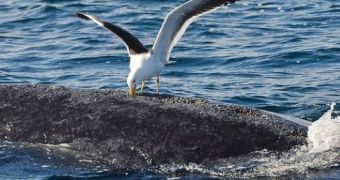It has not been long since we reported on Argentina's plans to start killing quite a lot of seagulls on a yearly basis, supposedly in order to help protect the whales that come to feed and give birth close to its coastal areas.
Back then, we explained that, although whales are notably bigger than seagulls, the latter must be held responsible for impacting on the health of the former, due to the fact that these birds have recently gone into the habit of feeding on the blubber of said marine mammals.
Thus, the seagulls simply use their beaks to push through the whales' skin, and then feed on the layer of fat found just under it.
Some of the wounds whales suffer as a result of this feast usually get infected, and from that moment on their general health is pretty much compromised.
Taking into consideration all of the above, it should not come as a surprise that something must soon be done to put an end to the whales' ordeal.
However, green-oriented organization Sea Shepherd argues that the plan to kill 1,200 seagulls yearly, supposedly to help bring their population within reasonable limits and thus protect the marine mammals they now feed on, is anything but the right thing to do.
As these environmentalists explain, the only reason for which Argentina's seagull population has witnessed this whopping increase in its overall headcount is that humans keep dumping trash in the open air.
Seeing how nothing appeals to these birds more than an easy meal, it was only common sense that they would gather by the hundreds near the areas where food was readily available for them to gulp down.
As well as this, fishing vessels often discard parts of their catch and fish guts in these waters, providing the seagulls with yet another source of nutrients.
Therefore, the first thing to do in order to save whales is to better manage Argentina's waste.
Just for the record, the whales that show up near this country's coastlines also help generate significant income from tourism, so one could argue that the decision to protect them at all costs could also be linked to financial incentives.

 14 DAY TRIAL //
14 DAY TRIAL //